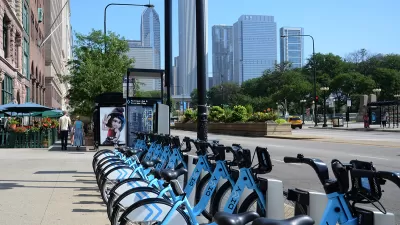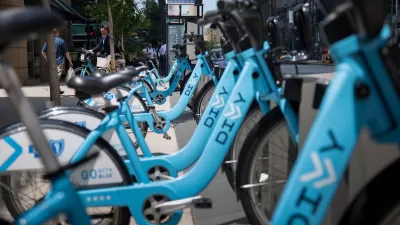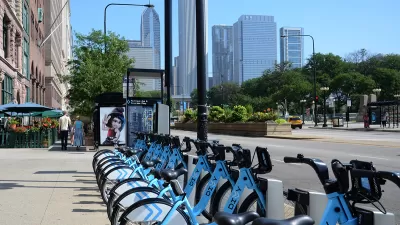Kerida Roland is an African-American delivery man based in Chicago's South Loop who put more than 6,000 miles on Divvy bikes in 2017.

Divvy's users are disproportionately wealthy whites, so when the agency announced its top rider was African American delivery rider from Bronzeville, the news seemed to break the narrative about bikeshare in Chicago. Kerida Roland rode 6,275 miles last year making deliveries everywhere from Hyde Park to Lincoln Park.
"Roland, a 25-year-old South Loop resident who takes delivery orders via the Postmates, Caviar, and Uber Eats smartphone apps, says his strategy isn't as crazy as it sounds," John Greenfield reports for the Chicago Reader. While using Divvy for work means he has to find stations periodically, he likes avoiding the maintenance and risk of riding his own bike. "Roland says he started using Divvy for deliveries after thieves nabbed three of his personal bikes, one of which he'd spent hundreds of dollars customizing," Greenfield reports.
So why don't more African Americans and Southsiders ride Divvy? Roland agrees with results of a study from the University of Portland which found, "Concerns about traffic safety, crime, police harassment, user fees, and liability for the bikes are factors in low ridership," Greenfield writes, but Roland goes on to say the city could do more to explain the program, particularly its benefits. Roland enjoys biking in part because it's more reliable than the El, and the freedom from traffic jams, means he knows when he will get where he's going.
FULL STORY: Divvy’s top rider of 2017 pedaled 6,000 miles while making food deliveries

Maui's Vacation Rental Debate Turns Ugly
Verbal attacks, misinformation campaigns and fistfights plague a high-stakes debate to convert thousands of vacation rentals into long-term housing.

Planetizen Federal Action Tracker
A weekly monitor of how Trump’s orders and actions are impacting planners and planning in America.

In Urban Planning, AI Prompting Could be the New Design Thinking
Creativity has long been key to great urban design. What if we see AI as our new creative partner?

Pedestrian Deaths Drop, Remain Twice as High as in 2009
Fatalities declined by 4 percent in 2024, but the U.S. is still nowhere close to ‘Vision Zero.’

King County Supportive Housing Program Offers Hope for Unhoused Residents
The county is taking a ‘Housing First’ approach that prioritizes getting people into housing, then offering wraparound supportive services.

Researchers Use AI to Get Clearer Picture of US Housing
Analysts are using artificial intelligence to supercharge their research by allowing them to comb through data faster. Though these AI tools can be error prone, they save time and housing researchers are optimistic about the future.
Urban Design for Planners 1: Software Tools
This six-course series explores essential urban design concepts using open source software and equips planners with the tools they need to participate fully in the urban design process.
Planning for Universal Design
Learn the tools for implementing Universal Design in planning regulations.
planning NEXT
Appalachian Highlands Housing Partners
Mpact (founded as Rail~Volution)
City of Camden Redevelopment Agency
City of Astoria
City of Portland
City of Laramie




























